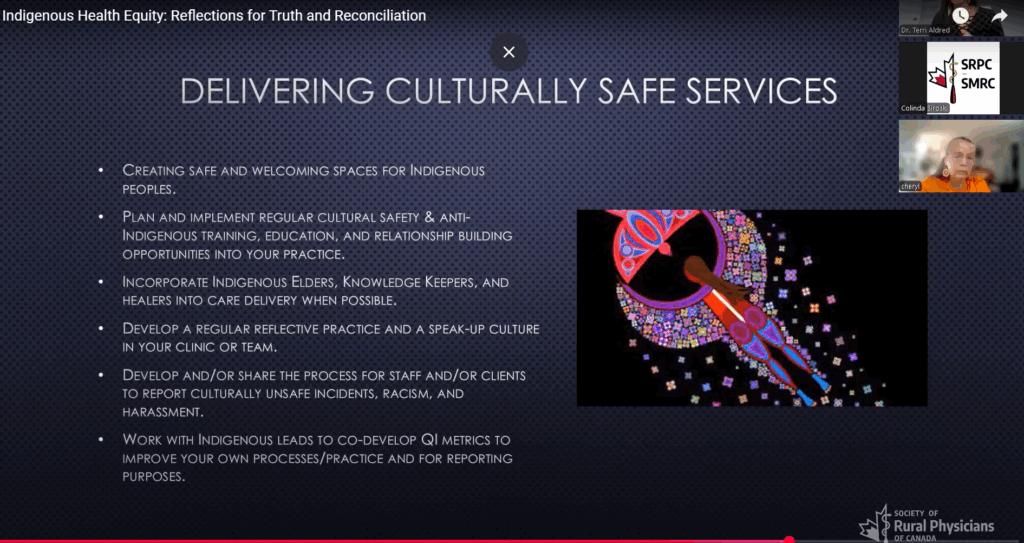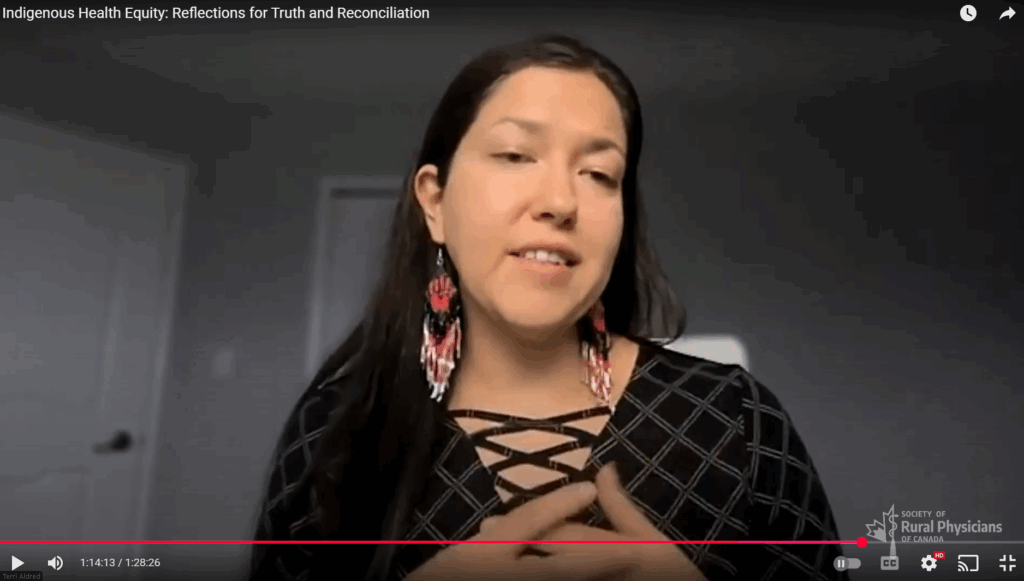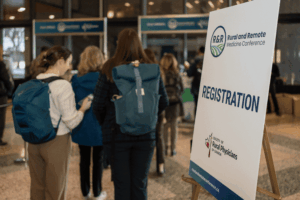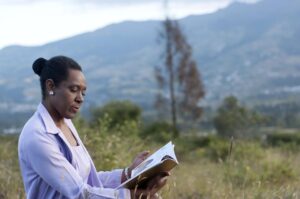

On Thursday, September 25, 2025, the Society of Rural Physicians of Canada (SRPC) hosted a Rural Reach Webinar featuring Dr. Terri Aldred, a family physician, educator, and advocate for Indigenous health, along with Elder Cheryl Schwitzer, who offered traditional opening and closing prayers. Today, on the National Day for Truth and Reconciliation, we reflect on the insights shared and the ongoing importance of Indigenous health equity.
Webinar Highlights:
- Grounding in Tradition and Family: Dr. Aldred shared the role of her matrilineal lineage in shaping her work, noting how teachings from her maternal grandmother and community guide her approach to healthcare. She emphasized the interconnectedness of individual, family, and community health.
- Cultural Safety vs. Competence: Cultural competence is not a box to check, it’s a lifelong practice. Cultural safety is determined by the people receiving care, and providers must continuously reflect on their biases and the systems they operate in.
- Indigeneity as Strength: Connection to culture, language, and land supports better health outcomes. For example, Indigenous youth engaged in multiple cultural practices report lower rates of suicidal ideation.
- Holistic Health and Women’s Teachings: Traditional teachings on women’s health, including moon cycles, coming-of-age ceremonies, midwifery practices, and placenta symbolism, highlight the holistic view of health and intergenerational connection.
- Trauma and Colonization: Chronic toxic stress, intergenerational trauma, and systemic discrimination affect nervous system regulation, physiology, and access to care. Indigenous patients may avoid care due to mistrust or prior negative experiences, leading to delayed diagnoses and worse health outcomes.
- Bias in Healthcare: Studies show Indigenous patients often face underestimation of pain and symptom dismissal. Healthcare environments under stress can exacerbate unconscious biases, making self-reflection and accountability critical.
- Indigenous Women and Gendered Impacts: Indigenous women and LGBTQTS+ communities experience disproportionate harms from colonialism and systemic racism, including sexualized stereotypes, violence, and coercive medical practices such as forced sterilization.
- Radical Consent: Beyond obtaining consent, Dr. Aldred emphasized “radical consent”, meaning repeated, clear, and ongoing consent, especially for sensitive exams, to empower patients and restore autonomy over their bodies.
- Supporting Indigenous Patients in Care: Small practical actions can improve care:
- Introduce yourself and acknowledge your own background.
- Ask about interest in traditional medicines or practices.
- Provide trauma-informed care, being aware of hypervigilance or dissociation.
- Make clinic spaces welcoming with Indigenous art, literature, or signage.
- Build relationships over time to foster trust and safety.
- Supporting Indigenous Healthcare Providers: Indigenous providers often experience lateral violence and trauma. Clinicians can act as allies by offering mentorship, support, and acknowledging the unique pressures Indigenous colleagues face.
- Reclaiming Childbirth Practices: Supporting childbirth closer to home and revitalizing Indigenous midwifery practices strengthens cultural continuity and connection to the land. Collaboration between traditional and Western medicine enhances safety and care quality.
- Advice for Students and Clinicians:
- Seek opportunities to work in Indigenous-led clinics or communities.
- Build relationships with preceptors experienced in culturally safe care.
- Participate in electives, fellowships, or programs focused on Indigenous health.
- Embrace discomfort and uncertainty, seek feedback, and approach care humbly.
- Recognize that Indigenous health is a Canadian issue, not just an Indigenous issue.
Conclusion & Call to Action:
SRPC encourages healthcare professionals to reflect on these teachings and integrate cultural safety, trauma-informed care, and respect for Indigenous autonomy into their practice. Practical steps from asking for repeated consent, including traditional practices, to creating welcoming spaces, can meaningfully improve care experiences.
The webinar reminds us that Indigenous identity is a source of strength, and health disparities are a consequence of systemic oppression, not inherent characteristics. By learning, reflecting, and acting with humility, healthcare providers can contribute to reconciliation and support Indigenous health and well-being.
Watch the full webinar on our Youtube channel: https://www.youtube.com/watch?v=SE16ae9TJJg to hear Dr. Aldred and Elder Schwitzer’s insights and guidance.
— The SRPC Team










